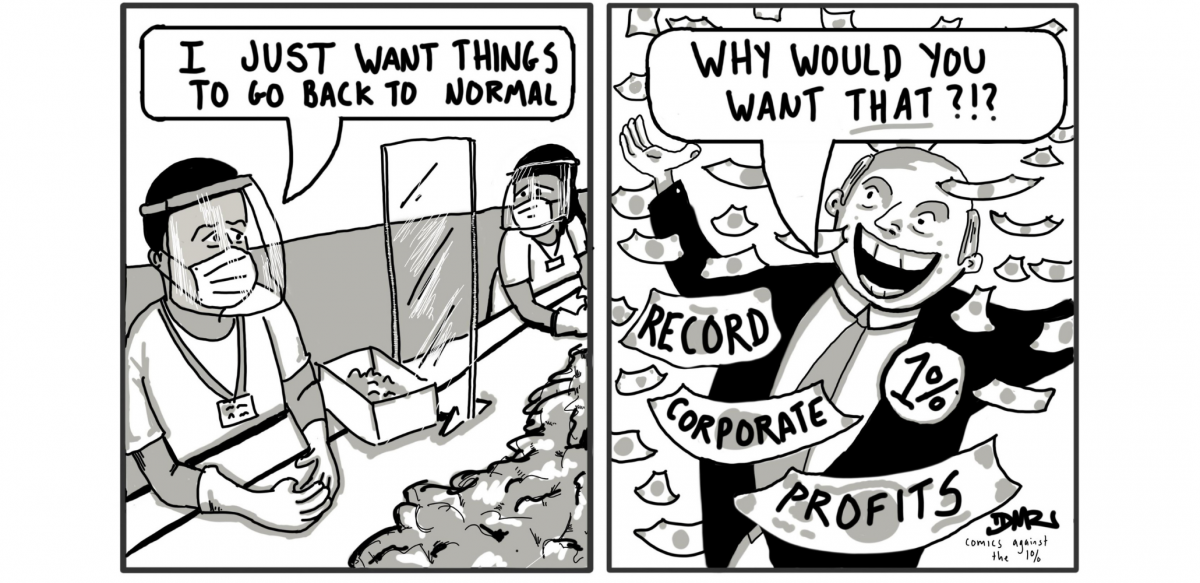Soak the Rich, Now More Than Ever

While working people suffer layoffs and furloughs, the rich have been watching their stock values soar. Cartoon: Dan Mendez Moore, Comics Against the 1%
As the recession deepens, unions will have to battle concession demands and budget cuts. But beyond these defensive fights there’s a demand whose time has come: let’s soak the rich.
Put another way: tax the hell out of them. Claw back the profits they’ve made off the backs of workers. Take that money, and put it to work expanding public services and giving people jobs.
The 118 billionaires in my state, New York, gained a staggering $77.3 billion in wealth during the first three months of the biggest financial crisis since the Great Depression. Through some combination of pandemic profiteering and run-of-the mill exploitation, they made unimaginable amounts of money while many people suffered.
That’s enough money to cover the state’s projected budget deficit almost six times over. It’s enough not only to plug the holes, but also to take on ambitious new projects that could put people to work.
And that’s even before you consider taxing the state’s half-million millionaires. There are 570,456 households here with a net worth of over $1 million—excluding their real estate.
Nationwide, the 50 richest people now have as much wealth as the bottom half of the population, 165 million people. While working people suffer layoffs and furloughs, the rich have been watching their stock values soar.
COUNT THE WAYS
How best to soak the rich? The extreme reach of their wealth gives us many options. In New York progressives are calling for taxing existing wealth and stock transfers, and gradually raising the state and city income taxes on big earners. (See makebillionairespay.info.)
You might slice it differently in your state, depending on local conditions and organizing prospects. Seattle just passed a tax on Amazon and other large corporations. California unions are backing a ballot initiative that would change how high-value commercial land is taxed.

SUPPORT LABOR NOTES
BECOME A MONTHLY DONOR
Give $10 a month or more and get our "Fight the Boss, Build the Union" T-shirt.
The easy part is thinking up better ways to spend the money—on a Green New Deal, public transit, public housing, education, health care… Our communities need such programs, and such jobs, more than ever. The one-two punch of the pandemic and the recession has hit poor people and people of color hardest, intensifying familiar inequalities.
Austerity isn’t a response to some objective financial reality. It’s a political program, based on an assessment of who has power. Politicians decide it’s less risky to slash public services than to go after the wealthy.
And they’re rewarded for it. New York Governor Andrew Cuomo, who has shot down raising taxes on the rich, has received campaign funds from 43 of those 118 billionaires.
WORTH A TRY
There are two paths through the depression we face. One is familiar: mass layoffs, millions of evictions. Remember 2008? How did that work out for us?
For labor, austerity and concessions will not only cut our wages but also undermine our power, perhaps more important in the long term. Outsourcing, adding new tiers, and the like produce a smaller, more fearful, and more divided membership—which will make it even more difficult to take on the boss next time around.
The second path is to marshal our forces—union and beyond—to demand an alternative, and where there’s resistance, to bring the disruptive capacity of the labor movement to bear.
If we lose, at the very least we’ve shown that the labor movement is willing to throw down on fights beyond its own parochial interests. In a better case, we’ve built out wider and deeper organization to fight for popular political demands. Across party lines, Americans agree that the wealthy have too much wealth and too much political power.
And if we win? We build our power, reduce the power of the wealthy, raise expectations, and materially improve the lives of millions of people. We can’t afford not to try.





